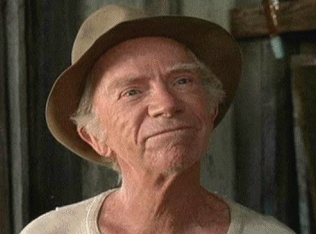Here’s a collection of quotations with analysis for the character of Candy. It also explains Candy’s relationship with George, Lennie and his dog.
- We see the theme of disability: he’s given light work “‘cause I lost my hand“. This highlights the lack of health and safety on the ranch and the fact that it may well have been the ranch’s fault. Candy seems very grateful to the boss for allowing him to keep his job as he repeatedly calls him “a nice fella“. Once he can no longer do his job, he’ll “be put on the county.” revealing how 1930s America was no place for sentimentality.
- Candy overhears George telling Lennie the fairy story of the dream, which leads to him offering them his $350. Suddenly, ‘the thing they had never really believed’ seems to be ‘coming true’. This is the power of faith.
- Candy buying into the dream increases the desolation at the end: it’s not just Curley’s wife that’s dead: it’s the American Dream: expressed in bitter language about Curley’s Wife “no good” “lousy tart” – and “So it’s all off“.
- Candy’s dog is also old and disabled. Carlson says “he’s no good to himself” uncomfortably echoing the idea that if you can’t work (because you’re disabled or old) you ought to be got rid of. He talks bluntly about the animal, just as Curley’s wife says of the dead puppy, it’s “only a mutt“. It’s uncomfortably close to thoughts about the value of human life – when it’s all so cheap.
- Candy wishes “someone would shoot me” when he becomes useless. The shooting of the dog also foreshadows the euthenisation of Lennie. Candy’s regret: “I should’ve shot the dog myself”) seems to push George towards his own actions at the end – where he has to man up to a hard choice.
- Loneliness: “ain’t got no relatives nor nothin’“, and when the dog is shot, he’s desolated – you can’t just get a new faithful companion. Candy ‘lay down in the hay and covered his eyes with his arms’.
- Finally, Candy is significant in the story as his gossiping nature is used by Steinbeck to give character information. For example, he says “I think Curley married a tart” and astutely comments, “Curley’s like a lot of little guys, he don’t like big guys“. Candy’s comments also reveal the racism Crooks endures, notably Candy’s casual racist account of how Crooks was beaten up one Christmas where “Smitty took after [beat up] the nigger“. Candy’s character previews build intrigue and tension as we wonder how Curley’s wife will act when we meet her and whether Curley will do anything to Lennie causing him and George to lose their jobs.

